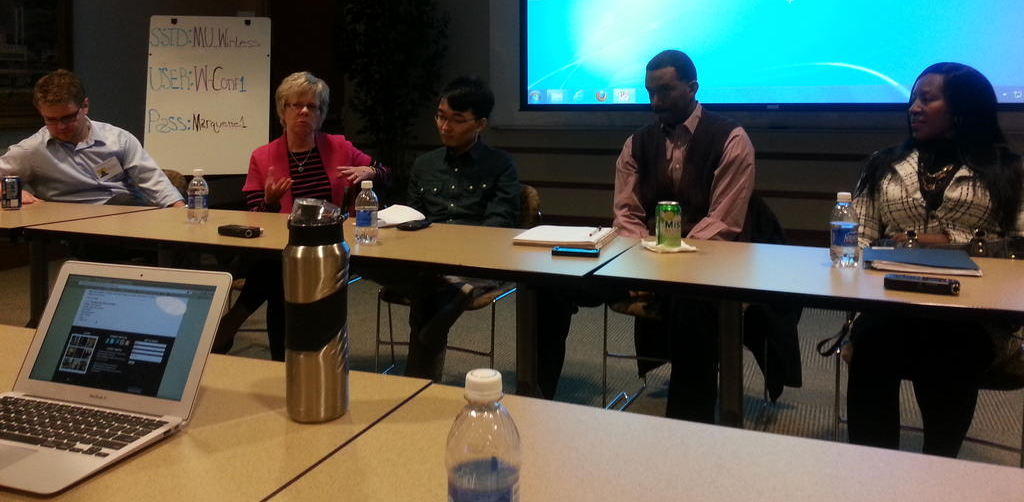On Tuesday Oct. 19 a panel of experts ended Marquette's Nieman Conferences by gathering to discuss how "New Media" affects the election, and electoral issues in modern times. The panel focused much of their attention on Twitter and Facebook and how these two social media giants influence campaign coverage.
The panel, moderated by Nieman professor of journalism Bonnie Brennan, was composed of Chioma Uguchukwu, assistant dean of the Diedrich college of communication, Joyce Wolburg, associate dean and professor of advertising, Herbert Lowe, journalism professional-in-residence, teaching assistant Arthur Thomas, and research assistant Hang Lu. All of the panelists are notable for their prolific use of social media.
One of the many topics discussed was the difference between how voters and campaigns utilize social media in the realm of elections. It is no secret that the internet, and Twitter and Facebook in particular, presents an infinite ability to communicate with those who are not normally in your sphere of influence. Campaigns take great advantage of this fact. Every candidate in every election has a Twitter account these days that they use to connect with voters. The grand failure of this is that not every candidate is doing their own tweeting. It is noticeable when a tweet was crafted and sent by an intern, which takes away from the sincerity of the message to an extent.
Voters, for their part, use Twitter in a far different way. They use it as a forum for political discussion with each other. The increased connectivity presented by Twitter allows voters to engage and debate the issues that matter most to them. Unfortunately this almost never happens in a meaningful way. Online debate between people with conflicting views is not often amicable, to say the least. What happens more often than not is people will unfollow, unfriend and block users with conflicting opinions. This constant act leaves our views unchallenged, never advancing the national debate and forcing two sides increasingly further apart.
Another topic that came up was the use of data mining by websites and political campaigns for use of targeting voters. Members of the panel seemed to view this act as an invasion of privacy, believing that what you post on your private Facebook page should not be sold to advertisers and politicians. This view is grossly misinformed. The internet is not a private forum for use, but rather an open stream of information. If you would not feel comfortable yelling personal information and opinions on a crowded city street then you should not feel comfortable posting it online, because the two are the same. If you would not be upset with a friend trying to talk to you about something they knew you would be interested in or trying to sell you something they knew you would buy, then you can not find objection with it being done on the internet.
The panel, moderated by Nieman professor of journalism Bonnie Brennan, was composed of Chioma Uguchukwu, assistant dean of the Diedrich college of communication, Joyce Wolburg, associate dean and professor of advertising, Herbert Lowe, journalism professional-in-residence, teaching assistant Arthur Thomas, and research assistant Hang Lu. All of the panelists are notable for their prolific use of social media.
One of the many topics discussed was the difference between how voters and campaigns utilize social media in the realm of elections. It is no secret that the internet, and Twitter and Facebook in particular, presents an infinite ability to communicate with those who are not normally in your sphere of influence. Campaigns take great advantage of this fact. Every candidate in every election has a Twitter account these days that they use to connect with voters. The grand failure of this is that not every candidate is doing their own tweeting. It is noticeable when a tweet was crafted and sent by an intern, which takes away from the sincerity of the message to an extent.
Voters, for their part, use Twitter in a far different way. They use it as a forum for political discussion with each other. The increased connectivity presented by Twitter allows voters to engage and debate the issues that matter most to them. Unfortunately this almost never happens in a meaningful way. Online debate between people with conflicting views is not often amicable, to say the least. What happens more often than not is people will unfollow, unfriend and block users with conflicting opinions. This constant act leaves our views unchallenged, never advancing the national debate and forcing two sides increasingly further apart.
Another topic that came up was the use of data mining by websites and political campaigns for use of targeting voters. Members of the panel seemed to view this act as an invasion of privacy, believing that what you post on your private Facebook page should not be sold to advertisers and politicians. This view is grossly misinformed. The internet is not a private forum for use, but rather an open stream of information. If you would not feel comfortable yelling personal information and opinions on a crowded city street then you should not feel comfortable posting it online, because the two are the same. If you would not be upset with a friend trying to talk to you about something they knew you would be interested in or trying to sell you something they knew you would buy, then you can not find objection with it being done on the internet.

 RSS Feed
RSS Feed